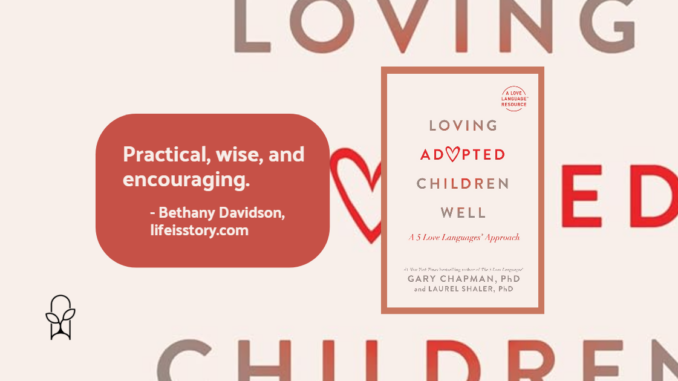
Also by this author: Holding on to Love After You've Lost a Baby: The 5 Love Languages for Grieving Parents, The 5 Apology Languages: The Secret to Healthy Relationships, Loving Adopted Children Well: A 5 Love Languages® Approach
Published by Moody Publishers on February 6, 2024
Genres: Non-Fiction, Adoption, Christian Life, Parenting
Buy on Amazon
Goodreads

Based on Chapman’s best-selling The 5 Love Languages®—a specialized resource of intentional love for families of adopted children.
Adoption brings unique challenges. Love and bonding don’t always come naturally. There can be emotional distress, frustration, and disappointment. In Loving Adopted Children Well, Dr. Gary Chapman along with professor and mom of adopted kids Dr. Laurel Shaler share how The 5 Love Languages® provide concrete steps to infusing love, hope, and attachment in your family.
In addition to the beauty and healing you’ll discover in the chapters on the love languages—Service, Gifts, Physical Touch, Quality Time, and Words of Affirmation—the authors provide essential chapters on subjects such as:
When You Don’t “Feel the Love”
Getting Spouses on the Same Page
Help for Single Parents
Stopping Sibling Rivalry
Support—Why it’s Needed and Where to Find It . . . and more.With empathy for adoptive parents, Chapman and Shaler provide an honest and invaluable resource of wisdom, joy, and healing. Apply the lessons from Loving Adopted Children Well, and you will see love grow and flourish in your home.
This new addition to the 5 Love Languages series focuses on adoptive families, with insights for how parents can better understand their adopted children’s needs and show clear expressions of love. This book is brief and highly readable, with simple explanations of important concepts and lots of engaging stories. Dr. Laurel Shaler writes from her experience as an adoptive mother and a therapist, and Gary Chapman gave feedback on the 5 Love Languages aspects. This book also includes a fictional case study that builds throughout the book, along with true stories and examples from adult adoptees reflecting on their experiences.
Dr. Shaler explains the significance of trauma as part of the adoptive experience, writes about attachment theory, and shares honest, practical encouragements for what parents can do when they aren’t feeling emotions of love for their child, or aren’t on the same page with their spouse about parenting. She explores how parents can express the love languages to their children, and she notes ways that the love languages may differ for adopted children. For example, she describes how some adopted children may feel uncomfortable receiving gifts that feel like bribery or an attempt to make up for their emotional losses with material things, and she addresses how different expressions of love can help kids with adoption-related struggles.
She also includes a chapter about more unique and challenging situations, including single parenting, divorce and remarriage, and dealing with cultural differences. Other chapters deal with sibling dynamics, resources and support that adoptive families can pursue, and adoption stories and themes in the Bible. The book includes many references to God and faith throughout, and Dr. Shaler digs deeper in this chapter at the end. This book is ideal for Christian adoptive families, but it can also be helpful for people with different belief backgrounds who are interested in the 5 Love Languages approach and wouldn’t find the faith elements off-putting.
Loving Adopted Children Well: A 5 Love Languages Approach is a great resource for both adoptive parents and people involved in foster care. This book covers a variety of important topics, and the author writes about psychological concepts in a simple, accessible way. This book is a great introduction for people to better understand the challenges that adoptive families face, and it is positive, practical, and encouraging. The author’s brevity and conversational writing style will make this a great fit for people who wouldn’t pick up a dense, academic book on the topic, and I recommend this to adoptive families and their supporters.
